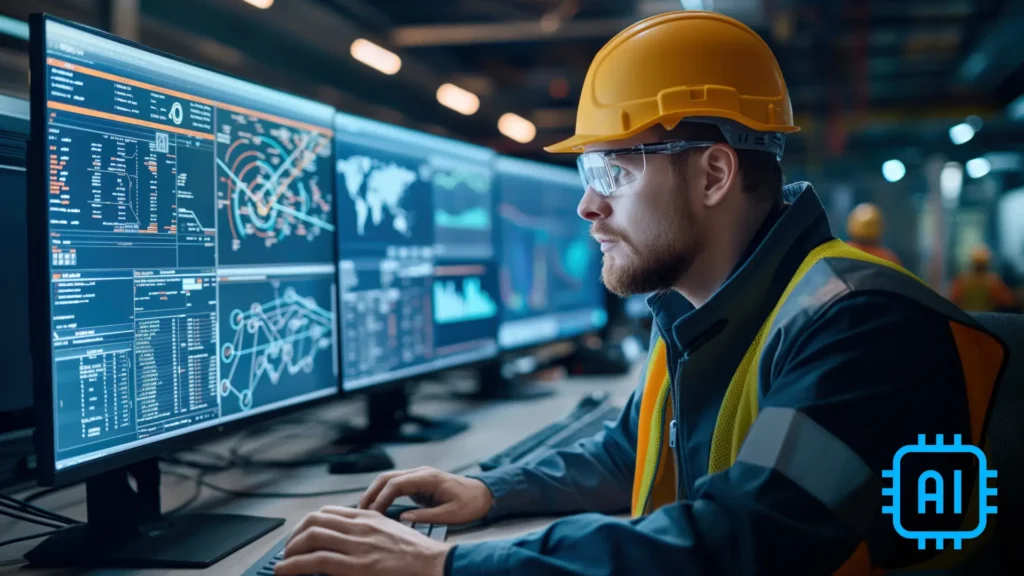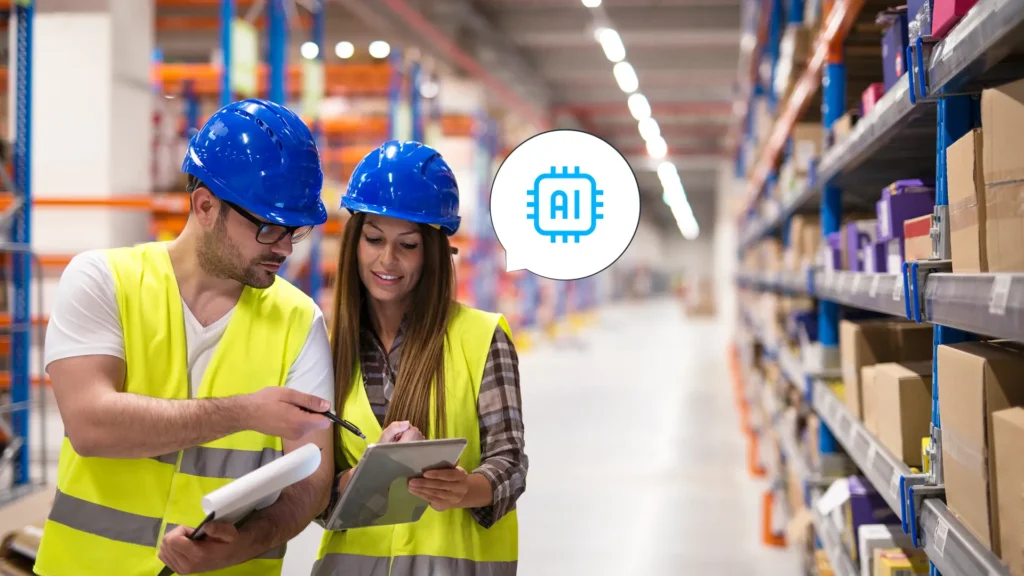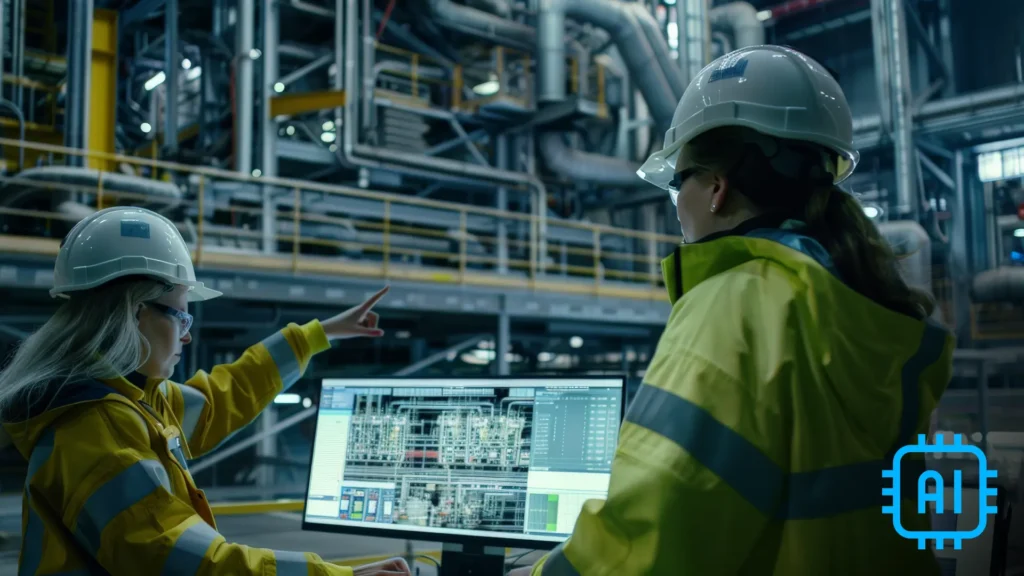The rise of AI in Manufacturing has shown a terrific shift in the way businesses operate. With immense advancements in Machine Learning, automation, and robotics, the application of AI use cases is opted by manufacturers to streamline their operations, increase overall productivity, and reduce costs.
According to Fortune Business Insights, the global AI manufacturing market size was expected to cross US $8 billion in 2019 and is likely to touch US $695.16 billion by 2032, showcasing a CAGR of 37.7% during the said phase.
There is no exaggeration that use cases of AI in manufacturing are ruling the industry. Today, most manufacturing businesses opt for Salesforce Manufacturing Solutions to stay competitive in the global market. The solution built helps optimize their operations and maintain customer retention through quality products. There are ample opportunities to use Artificial Intelligence in production houses.
Let’s learn a few essential ones.
Top 15 use cases of AI in manufacturing
AI in manufacturing use cases is depicted by real-world applications that show how AI and ML are improving production capacities and also demonstrate top-notch benefits to industries. From predictive maintenance use cases to AI-powered manufacturing analytics, Artificial Intelligence has reshaped every stage of production. Smart factories today deploy AI and ML solutions to accelerate their production while maintaining safety and quality. Let us see some of the AI use cases for the manufacturing industry.
Predictive Maintenance Using AI

Predictive maintenance in manufacturing is essential to save costs and time. With the capability to analyze data from sensors, machines, and industrial Internet of Things (IoT), AI can anticipate when equipment is likely to fail or give up.
Manufacturers can bring down expensive downtime and improve the equipment’s life by scheduling maintenance before a breakdown occurs. This helps in maintaining a consistent production without any glitches. AI-based analytics improve reliability and save resources. Here are a few known AI in manufacturing use cases.
- Proactive equipment repairs: AI allows maintenance teams to solve problems before they lead to machinery failures. This reduces unplanned downtime.
- Lower operational costs: AI saves money in maintenance costs as well as loss in production time by reducing unplanned downtime and minimizing repairing work.
- Optimized resource allocation: Maintenance is scheduled by considering real-time data and minimizing disruptions to ensure that resources are placed effectively.
AI-Based Quality Control
AI in quality control can boost traditional inspection methods by using machine vision and deep learning algorithms to trace any issues. Human inspectors may miss small defects, but AI systems can scan even a minute flaw in production at high speed and accuracy to ensure that there is no faulty product leaving the factory. AI analyzes product features and characters like color, shape, texture, and so on.
- Reduced scrap rates: AI can help reduce the production of defective products that need to be reworked or discarded by catching defects earlier.
- Increased inspection speed: AI performs quality checks way faster than a human workforce. This speeds up the production process.
- Better accuracy: Artificial Intelligence shows excellent precision in identifying issues that reduce the risks of damaged or faulty products reaching the market.
AI-based Production Optimization
AI-based production optimization uses data from the entire manufacturing process ecosystem to augment manufacturing workflows and, therefore, identifies phases where operations need more streamlining.
Real-time data analytics in manufacturing through AI constantly adjusts operations to overcome inefficiencies by analyzing key metrics like cycle time, throughput, and machine performance.
- Reduced optimization: AI makes sure that machines, labor, and raw materials are placed efficiently. Hence, workflow and workforce are optimized.
- Increased throughput: Artificial Intelligence dynamically streamlines processes to adjust production speed and manufacturing outputs.
- Reduced wastage: AI helps to bring down excess materials and time spent on non-productivity by tracing out inefficiencies with precision and pace.
Smart Inventory Management with AI

Inventory management is another one of the AI in manufacturing use cases. AI performs a marvelous job by anticipating demands and automating inventory replenishment. Artificial Intelligence software tools and agents ensure that manufacturers maintain optimum stock levels by analyzing historical data and external factors like seasonal trends in the market.
Overall, AI in manufacturing can reduce stockouts and overstocks resulting in more efficient supply chain management.
- Real-time stock updates: AI constantly tracks inventory levels and maintains automatic reordering to keep supply chains healthy.
- Smarter demand forecasts: AI agents can predict future product demands by analyzing data-driven information. This ensures that inventory would match consumer demands.
- Cost reduction: Using Agentforce can increase ROI for manufacturers especially with Manufacturing Cloud as it brings down the storage costs and also risks of holding excess/obsolete stock by optimizing overall stock levels.
AI-Driven Supply Chain Optimization

AI can get you precise and actionable supply chain analytics by evaluating enormous amounts of data from suppliers, demand forecasts, and logistics. The tool can gauge potential issues and recommend alternative solutions to curb any supply chain issues. In addition, AI can also optimize routing and delivery schedules to ensure on-time shipments.
- Cost-efficient logistics: AI can optimize delivery routes and methods of fuel-efficient transportation to reduce shipping costs.
- Real-time risk assessment: Artificial Intelligence in manufacturing can be optimized for predicting supply chain disruption based on environments, geopolitics, and market trends. This helps manufacturers take precautionary measures in advance.
- Improved supplier relationships: AI helps manufacturers evaluate supplier behavior and performance to make sure that the best partners are chosen for reliability, cost, and quality.
Automated Assembly using Artificial Intelligence
AI-powered software tools for manufacturing can transform assembly lines and perform repetitive tasks with accuracy and pace. AI robots work continuously without getting tired and perform hard tasks such as part placement, welding, and screwing. AI-driven robots can adapt to different product lines and offer flexibility even in extreme manufacturing environments.
- Lower labor costs: Automation can bring down reliance on the human workforce for repetitive and manual jobs – this leads to saving costs and time.
- Increased speed: Automated robots work way faster than humans. This speeds up the manufacturing or production cycles of any product.
- Flexibility in production: AI systems in manufacturing can be optimized or customized quickly. This allows the production of different products without any issues of downtimes or production halts.
Energy Efficiency through AI Solutions
Energy consumption and adjusting its efficiency is one of the AI use cases in the manufacturing industry. Optimum energy usage in manufacturing is one of the growing concerns due to its costs and environmental effects.
AI helps reduce waste by optimizing energy use throughout manufacturing units. AI recommends adjustments to enhance productivity and bring down energy consumption while reducing costs by continuously analyzing energy flow and data.
This is especially valuable for manufacturers dedicated to sustainability.
- Lower utility costs: AI can reduce energy waste and hence it leads to lower bills and cost savings in the long term.
- Real-time energy monitoring: AI monitors energy consumption and provides inputs to adjust usage throughout systems and machinery.
- Sustainability: Artificial Intelligence in manufacturing can help you attain sustainability by minimizing energy consumption and bringing down your carbon footprint in the manufacturing units.
Smarter Product Design with AI
Yet another one of the AI in the manufacturing industry use cases is designing any sort of product. AI helps in the product design process as it can suggest optimization based on performance data.
AI explores innumerable design variations using generative designs and helps manufacturers build products that meet both cost goals and functionalities.
AI in product design and development can also reduce the need for physical prototypes and hence it can speed up the overall production process.
- Cost-effective production: AI can suggest designs that reduce material usage and manufacturing perplexity. Hence, the overall cost of production is brought down.
- Faster prototyping: Artificial Intelligence allows manufacturers to quickly get on to the designs and hence it reduces time to build new products with innovation and pace.
- Uniqueness: AI tools in manufacturing can bring innovative designs with the help of ergonomics implementation. As a result, the product has the best UX boosting chances of business profits.
Workspace Safety Using Artificial Intelligence
AI-powered software solutions for manufacturing improve workplace safety as you can monitor workers’ behaviors and the environment for essential threats and hazards. AI systems can help businesses detect dangerous actions or unsafe conditions like workers being too close to machines and trigger immediate alerts.
Such a proactive approach can help organizations prevent unwanted accidents and promote a safer environment in manufacturing units.
- Reduced workspace injuries: AI can help prevent mishaps and tragedies by identifying risks earlier. This creates safer work setups.
- Real-time threat detection: AI systems can spot dangerous locations and incidents well in advance and can issue warnings in time.
- Compliance monitoring: For a safe working environment, AI can enforce safety protocols and regulatory standards to track safety precautions.
Improving Customer Relationships Using AI Personalization

To stay ahead of the competition, manufacturers are now employing AI technology as customers expect on-time delivery, better quality, and more tailored communications. Using Agentforce to enhance customer experience in the manufacturing industry enables a deeper understanding of customer behavior and preferences helping define targeted action plans, tailor offers, and build lasting partnerships.
AI Agents analyze feedback, purchase behavior, and levels of interaction and attention to provide useful insights for product marketing, design, and after-sales support.
- Tailored product recommendations: AI makes suggestions for products or configurations that a user has used formerly and what movements in the market are like; this increases satisfaction and retails.
- Flexibility in after-sales service: AI-powered omnichannel chatbots and virtual assistants respond to customers’ questions 24/7; this ensures that clients and customers get immediate and accurate answers and effective resolutions to issues.
- Sentiment analysis: AI tools work with review sites, social media, and service calls analyzing them for satisfaction trends and improvement areas in real time.
AI in Demand Forecasting
One of the AI use cases for the manufacturing industry is predicting what customers need. AI in demand forecasting uses market trends, consumer demands, and historical data on sales to anticipate product demands. This can help manufacturers build production schedules and other strategies to manage inventory levels. This also ensures that companies meet customer needs without underproducing or overproducing.
- Improved inventory management: AI predicts demands with more accuracy and speed. This helps manufacturers avoid overstocking and stockouts.
- Comprehensive data analytics: A wide range of factors such as market conditions and historical sales data can result in better and more accurate forecasting making it beneficial for companies to manufacture products and make it available on time.
- Agile production: AI in manufacturing ensures that companies quickly adapt to changes in customer and market demands without any hassle.
AI-Enabled Workflow Automation
AI is a powerful technology that makes automating manufacturing processes possible. Tasks like material handling, sorting, and packaging are easily handled by AI systems in manufacturing units. AI-driven robots can also free human workers to put their efforts elsewhere.
- Reduced manual labor: AI can automate repetitive tasks and thus bring down the need for manual human labor. Ultimately, it reduces the overall costs.
- Better precision: AI-driven systems perform jobs with greater pace and accuracy. This reduces the chances of errors that otherwise happen with manual entries.
- Faster production cycles: AI in industrial automation can speed up production cycles which allows businesses to meet short deadlines without compromising on quality.
AI-Driven Production Analytics

Manufacturers use AI-powered analytics to get actionable information from huge sets of production data. Smart manufacturing with AI can help industry experts identify inefficiencies by analyzing historical and real-time information and predicting issues to optimize production lines.
Manufacturers are thus informed and make strategic decisions based on data and shreds of evidence.
- Strategic insights: AI can predict future trends and issues. This enables proactive measures to production processes.
- Constant process optimization: Artificial Intelligence software solutions in manufacturing units can offer ongoing recommendations to improve efficiency and bring down operational costs.
- Better decisions: AI helps companies make smarter decisions through process adjustments.
Digital Twin Manufacturing
A digital win is a virtual mode of physical objects, processes, or machines. This means manufacturers can simulate and test their products with real-life scenarios and use cases. AI-driven predictive maintenance and process optimization are two prime examples of digital twins.
Manufacturing units can gauge issues even before they occur and take corrective measures by simulating the production environment before they interrupt manufacturing processes.
- Process optimization: You can keep your eye on monitoring digital twin and hence optimize operations in real time to save resources and costs that might occur later.
- Simulated testing: AI enables manufacturing units to test modifications in a controlled environment before getting them on the physical production lines.
- Curb risks: Digital twins can identify potential issues in advance. This reduces the risks of unexpected downtimes and process failures.
Automation in Production Line Scheduling
Salesforce AI agents can be optimized to automate production line scheduling and adjust schedules based on real-time information from myriad sources. It also adjusts the availability of workers and materials making this dynamic scheduling curb downtime and enhance machine optimization for the best outputs meeting standards.
- Minimized downtime: AI can reduce unnecessary glitches and stops to ensure that the production flow is smooth and uninterrupted.
- Increased machine utilization: AI can ensure that machines always work in their best conditions and optimal capacity to produce standard products.
- Dynamic scheduling: Artificial Intelligence manufacturing solutions can adjust production schedules with automation. It can consider resource availability and current conditions to optimize the overall manufacturing processes.
Ready to Build Bespoke Solutions Powered by AI in Manufacturing?
AI is transforming the manufacturing industry by streamlining all production line cycles. For instance, Einstein AI backed quality control can further ensure that your product meets unmatched quality. there are ample other benefits of AI in manufacturing to improve your efficiency and cut costs while delivering top-notch products that are scalable and user-friendly.
If you own or run a modern-day manufacturing unit, predictive maintenance, and AI in supply chain optimization are just a few smart manufacturing solutions to stay competitive and relevant. Don’t fall behind, we can help you with AI in Salesforce optimized for your manufacturing unit.
Drive greater innovation with us and stay efficient for the years to come. Precisely, you can integrate smart manufacturing technologies like Einstein AI into your operations and lay the milestones for the smart factories of the future.
Frequently Asked Questions on AI in Manufacturing Use Cases
What are common AI use cases in manufacturing?
Use cases include predictive maintenance, quality inspection, production optimization, demand forecasting, supply chain optimization, and robotics automation to reduce errors and streamline processes.
How does AI help in demand forecasting for manufacturers?
AI analyzes historical sales, market trends, and external factors to predict future demand. This helps manufacturers optimize inventory, reduce stockouts, and align production with real needs.
Can AI automate quality control in factories?
Yes. AI-powered vision systems inspect products on assembly lines for defects. This reduces human error, speeds inspection, and ensures higher consistency in quality.
How does AI optimize supply chain operations?
AI models help predict delays, optimize routing, and manage supplier risk. This leads to more resilient and efficient supply chains with fewer disruptions and lower costs.
Are AI-powered robots widely used in manufacturing?
Yes. Autonomous robots and cobots handle repetitive, dangerous, or precision tasks. They improve operational safety, efficiency, and allow human workers to focus on higher-level work.
What are the barriers to deploying AI in these use cases?
Barriers include data silos, lack of skilled personnel, high upfront costs, system compatibility, and ensuring models generalize well to real-world variations.



















